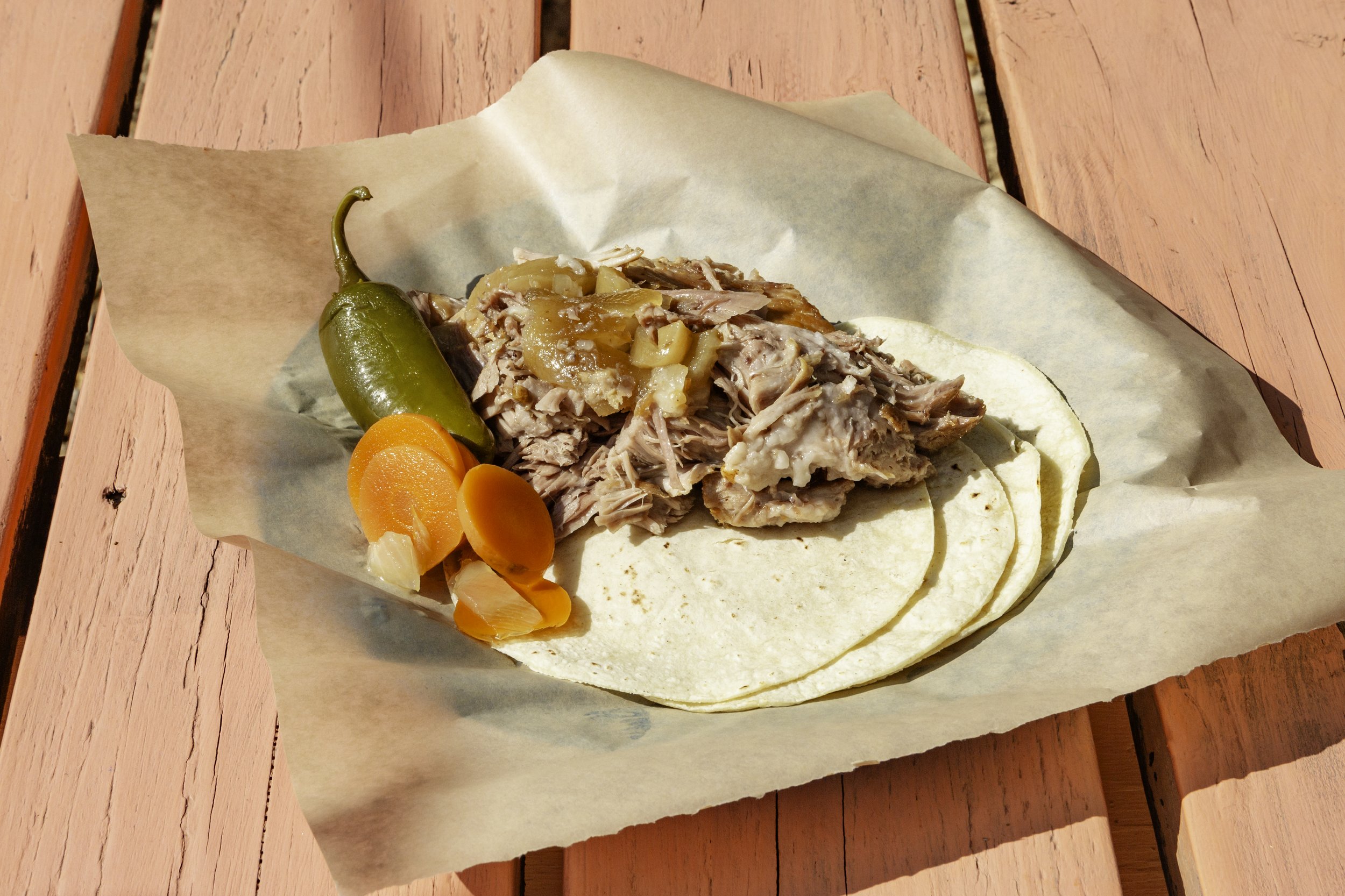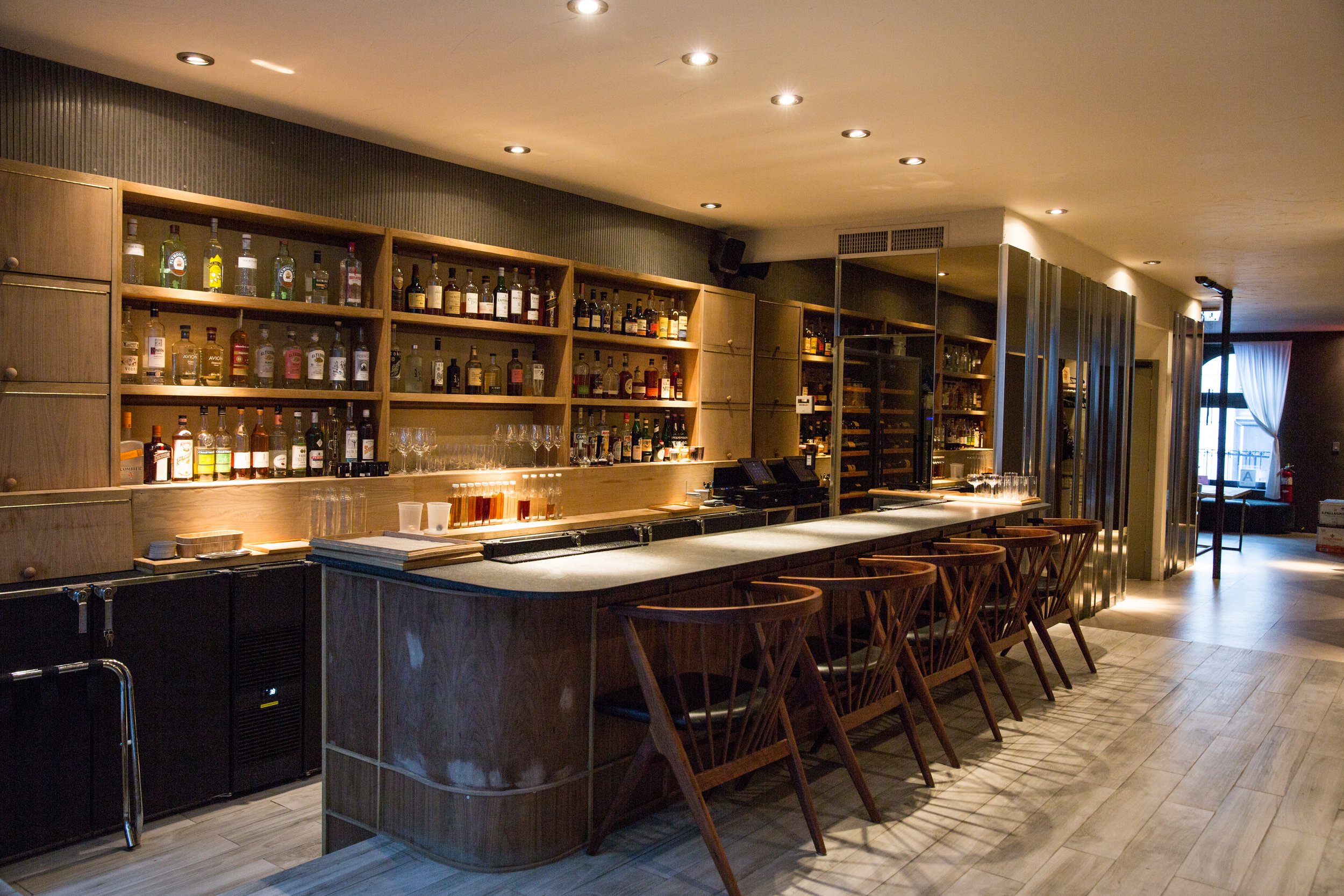Plaza Carnitas
Chef Alex Parades built an ever-evolving community for chefs in South San Antonio.
photos: raeann serra
When Chef Alex Paredes opened Carnitas Lonja in a former abandoned lot just south of Downtown San Antonio, the inexpensive location offered him a chance to start a business, and it challenged him to attract customers. Now, seven years in, he focuses on bringing more restaurants into the area and building a greater sense of community.
In a small plaza-like setting that houses three separate, small buildings with an outdoor seating area in the middle, Paredes has created a clever arrangement. The piecemeal setup allowed him to build gradually: “I found this place, it used to be a small diner in the 40s, and then a cafe. I had just enough money to fix the first building, with three tables outside.” Over time, Paredes expanded and opened Carnitas Lonja and Fish Lonja in the first two buildings, with the third housing indoor seating.
In 2023, he decided to combine Carnitas Lonja and Fish Lonja into one location, and now, he subleases the remaining buildings to two other businesses with the idea of “creating a small food hall.” One, Lovers Pizzeria, sells its pies on weekends. The other, Leiah, offers arepas, empanadas, and other Venezuelan street food. The three restaurants schedule their work around each other so they can do the bulk of their cooking in advance.
This way, instead of one business paying a total of about $4,500 a month for rent, utilities, trash pickup, internet service, and other overhead, Paredes is splitting that cost with the two other restaurants.
“The goal is for each space to have its own kitchen. Right now, for everybody, it’s way better to share space. It’s about trying to keep up what you already have,” Paredes said. “They pay low rent, we pay low rent, it works for all of us.”
A native of Morelia, Michoacán, Paredes grew up between Mexico and the United States. After earning a business degree at the University of Texas at San Antonio, he worked his way up from busser to sous chef at a series of local restaurants and began doing fine dining pop-ups with fellow chef Sergio Ortega in 2016 through early 2017.
Those events garnered him a following, so when Paredes opened Carnitas Lonja in 2017 to focus on his home state’s most famous dish, his business quickly gained traction.
Even though the city abounds with molinos and carnicerias offering their own versions of carnitas, and the local grocery chain H-E-B selling packages of ready-to-heat carnitas, Paredes’ version from Michoacán came as a revelation. His carnitas utilize pork butt that is slowly simmered in hotel pans in a 6-year-old mother lard and salt to create a confit-like texture. Lonja literally translates to “slice,” but is also a slang term meaning “love handles”and “belly.”
Not long after Paredes opened, local culinary legend Andrew Weissman brought in a visiting writer from the New York Times. Accolades soon poured in from all over the country. Customers queued to snag carnitas, and Paredes often ran out, like brisket from a barbecue temple.
“We were only able to make as much as we could in a day. It's a two-day process,” he said. “When we started getting reviewed, critics would return a second time and say it’s exactly the same. This is why.”
Then, Covid shutdowns forced Paredes to get creative.
“During the pandemic, we were able to pay for things [because of the business model]. “Even if it just gets your name out there, you can stay there for a year and people get to know your product, and you can build a clientele.”
At first, Paredes sold his carnitas in quarts, allowing for a sustainable takeaway business. “When we first started, it was sold only by the pound, selling like 60 to 70 pounds a day, on the weekend around 150. There was a stigma that we didn’t know how to do tacos. So when we moved buildings, we needed to bring people in and make it affordable, so that's how we came to this menu. Now we sell more tacos than carnitas by the pound.”
He initially tried opening the space to ambitious cooks with passion and ideas but little business experience, then he quickly changed his focus.
“I’m curating the space, and people have to be more legit on the business side of it,” he said. “They need insurance, need to be compliant with the city, all the things you need to run a restaurant.”
In the coming months, Paredes will open a Middle Eastern concept, Southside Shawarma, focusing on Tex-Mex and Middle Eastern flavors. In his plaza, he also plans to invite food trucks and stalls to operate periodically. “We could have three or four restaurants, and have things that change from one day to another,” he said.
“We're trying to bring a little bit more traffic, more options,” he said. “It’s for the neighborhood, because we also live here.”








